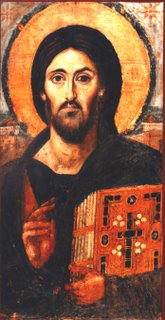"The Love of Christ Controls Us."

It was the fashion – and still is in some places, I suppose – for Episcopal priests to connect all three Scripture lessons and the psalm in their Sunday sermons. This was the big creative, homiletic task, to find a common thread and expound it (in the days of the old prayer books, prior to the current revision, that thread was normally the theme of the Collect of the Day – but that’s another story) – or, too often, to preach about whatever one wants and then take a few glancing swipes at the lessons to give the illusion of Scriptural support. In any case, I am just not up to preaching three lessons and a psalm all at once (and the many of you who think I preach too much and too long already will be glad I don’t try!). Instead, I try to take one of the lessons and show how “the grace of our Lord Jesus Christ and the love of God and the fellowship of the Holy Spirit” (2 Cor. 13.14) – all of which is ultimately one thing in the mystery of the Holy Trinity – in its goodness and severity is revealed in the text, and then to make some application of it to our lives, calling myself and all of us to turn again to the Lord. I want to make a passage of Scripture clear, because the Spirit speaks to us there. I want to preach the Bible, not my own ideas. After all, my own personal thoughts about “life, the universe, and everything” are fascinating (at least to me), but honestly, who cares? In any case, that’s what I’m trying to do up there in the pulpit each Sunday, and may I take this opportunity to say that I rely on your prayers for my success?
All of that is a long introduction to saying that preaching a single text often means making a hard choice between the lessons assigned in the lectionary. So, for instance, on the last Sunday in June I had to pass by with a wistful glance the epistle lesson from 2 Corinthians where St. Paul writes to that troubled church, “the love of God controls us, because we have concluded this: that one has died for all, therefore all have died; and he died for all, that all who live might live no longer for themselves but for him who for their sake died and was raised” (5.14,15). Were I writing a sermon, and not a newsletter article, I would want to spend some time wrestling with that phrase of the Apostle’s, “the love of Christ controls us…” Grammatically, I understand that “the love” is the subject of that sentence – it is what “controls us.” But that subject is modified by a “genitive” which is just as ambiguous in St. Paul’s original Greek as it is in the English translation above. Is St. Paul saying “our love for Christ controls us” or “Christ’s love for us controls us”? Grammatically it could go either way, though most of the English translations which make a choice go with “Christ’s love” (so, for instance, the New International Version in our pews).
But why? I would like to hold out the possibility that St. Paul used an ambiguous phrase because perhaps he meant both things at the same time. We are controlled by Christ’s love in the sense that, as much as we might wish to turn our backs on someone who has offended us, we dare not turn away from one for whom, as for us, Christ died. On the other hand, our love for Christ controls us in the sense that we actively, really love Christ by loving others, especially those in the household of the Church.
But all of that leads to the question, what is it that “controls” us? Is it the “love of Christ” (one way or the other), or is it something else? Ambition, fear, self-preservation? Something will control us; as Bob Dylan sang, “you’re gonna have to serve somebody.” Our task then is to yield ourselves more and more to Christ, coming to love him who first loved us – or as St. Paul has it, “he died for all, that all who live might live no longer for themselves but for him who for their sake died and was raised.” Loving Christ begins with the realization that he loved us, and the greater our realization of that love, the more we will love – and be controlled by love, a slavery better than all others, a “service” which, as the Prayer Book says, is “perfect freedom.”
*This article is from the July issue of our parish newsletter.

0 Comments:
Post a Comment
<< Home